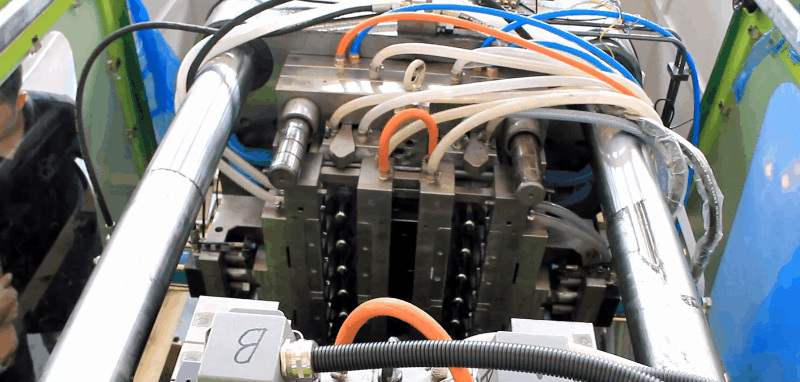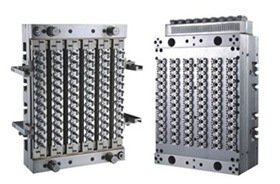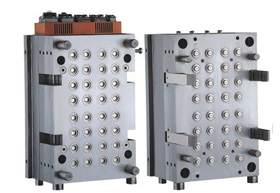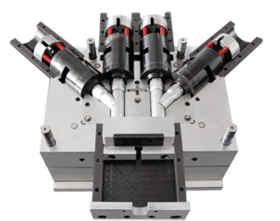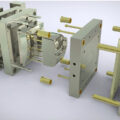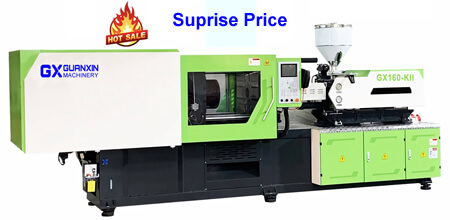Polyethylene terephthalate (PET) has excellent chemical resistance and barrier properties, good strength, rigidity, fatigue endurance, and abrasion resistance. Typical Applications of Polyethylene terephthalate (PET) Automotive – mirror backs – grille supports – head lamp reflectors – alternator housings Electrical applications – motor housings – electrical connectors – relays – switches – microwave oven interiors Industrial applications – furniture chair arms – pump housings – hand tools – PET bottles and containers Plastic PET Injection Molding Processing Conditions Runners and Gates of PET Injection Mold All conventional types of gates can be used. Gates should be 50–100% of the part thickness. Chemical and Physical Properties PET is an aromatic polyester produced from the polymerization of either terephthalic acid (TPA) or dimethyl ester terephthalic acid (DMT) and ethylene glycol (EG). The glass transition is approximately 165°C [330°F] and the material crystallizes over a temperature range from 120°C–220°C [248°F–428°F]. PET is highly sensitive to moisture at high temperatures and exhibits excessive warpage when reinforced with glass fibers. The promotion of crystallinity is achieved through adding nucleating agents and crystal growth accelerators. Crystalline moldings
Read more →Polyetherimide (PEI) is an amorphous thermoplastic with high-temperature resistance, strength, and stiffness. Typical Applications of Polyetherimide (PEI) Automotive – engine components – temperature sensors – fuel and air handling devices Electrical/electronics – connector materials – printed circuit boards – circuit chip carriers – explosion-proof boxes Packaging applications Interior aircraft materials Medical – surgical staplers – tool housings – non-implant devices Plastic PEI Injection Molding Processing Conditions Chemical and Physical Properties of Polyetherimide (PEI) The chemical structure of PEI consists of repeating aromatic imide and ether units, which accounts for its high temperature resistance. This structure also leads to high stiffness and modifiers are used to make the material processible. PEIs are very stiff and strong even without reinforcements, and they have excellent thermal stability so they can be used in high temperature applications. They also have good flame and chemical resistance, and effective electrical insulation properties. The glass transition temperature is high (215°C [419°F]). PEI exhibits low shrinkage and highly isotropic mechanical properties.
Read more →Polycarbonate and polybutylene terephthalate blends (PC+PBT) combine the properties of PC and PBT, including the high toughness and dimensional stability of PC, and the lubricity and good chemical and heat resistance of crystalline PBT. Typical Applications of PC+PBT material Gear cases Automotive bumpers Applications which require – chemical and corrosion resistance – high heat resistance – high impact strength over wide temperature ranges – high dimensional stability Plastic PC+PBT Injection Molding Processing Conditions
Read more →Polycarbonate-acrylonitrile-butadiene-styrene blend (PC+ABS) combines the properties of PC and ABS, that is, the high processibility of ABS with the excellent mechanical properties and the impact and heat resistance of PC. The ratio of the two components affects the heat resistance. The blend exhibits excellent flow characteristics. Typical Applications of Plastic PC+ABS Computer housings Business machine housings Electrical applications Cellular phones Lawn and garden equipment Automotive – instrument panels – interior trim – wheel covers Plastic PC+ABS Injection Molding Processing Conditions
Read more →Polycarbonate (PC) is an amorphous engineering material with exceptionally good impact strength, heat resistance, clarity, stabilizability, flame retardancy, and stain resistance. Typical Applications of Polycarbonate (PC) electronic and business equipment - computer parts - connectors appliances - food processors - refrigerator drawers automotive - head lights - tail lights - instrument panels Plastic PC Injection Molding Processing Conditions Chemical and Physical Properties of Polycarbonate (PC) PC is a polyester of carbonic acid. All general-purpose polycarbonates are based on bisphenol A. The bisphenol A component of the molecule contributes to the high glass transition temperature (150°C [302°F]). The rotational mobility of the carbonyl group within the molecule contributes to the high ductility and toughness of the material. The notched Izod impact strength of PC is very high and mold shrinkage is low and consistent [0.1–0.2 mm/mm]. High molecular weight PCs (which translate to low MFR) have higher mechanical properties, but processibility of such grades becomes difficult. The type of PC chosen for an application should be based on the desired criteria. For high-impact properties, use a low-MFR PC; conversely, for optimal
Read more →Polybutylene Terephthalate (PBT) has high strength and rigidity for a wide range of applications. PBT is one of the toughest engineering thermoplastics. Typical Applications of Polybutylene Terephthalate (PBT) household appliances – food processor blades – vacuum cleaner parts – fans – hairdryer housings – coffee makers electronics – switches – motor housings – fuse cases – key caps for computer keyboards – connectors – fiber optic buffer tubing automotive – grilles – body panels – wheel covers – door components – window components Plastic PBT Injection Molding Processing Conditions Runners and Gates OF PBT injection mold Full round runners are recommended to impart maximum pressure transmission. A guideline for the runner diameter is part thickness + 1.5 mm. A wide variety of gates may be used. Gate diameters should preferably be between 0.8–1.0 times the part thickness. When using circular tapered gates, the minimum recommended diameter is 0.75 mm. Hot runners may also be used, taking care to avoid drool and material degradation. Chemical and Physical Properties of Polybutylene Terephthalate (PBT) PBT is a polyester that is produced by the
Read more →